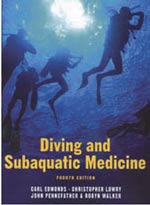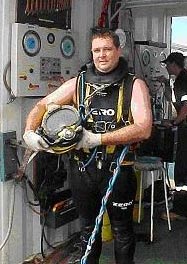The BScMedScHons (Underwater Medicine) degree programme
Underwater Medicine Refresher Courses
Most diving medicine training programmes (even internationally) are subject to a legal requirement of refresher training to keep the registration as a Designated Medical Practitioner (or equivalent) current. The South African legislation requires refresher training every four years (Regulation 4 of the Diving Regulations, 2001). This applies to module 1 and module 2 of the degree programme.
Below you will find a description of the refresher courses being offered by the Stellenbosch University.
Brief description
Module 1 refresher: Totally presented via the internet with no contact time. Guidance through the textbook and additional downloads is provided via the internet. | Module 2 refresher: Guided training is provided via the internet. Students are guided through the textbook and additional downloads. Practical training coincides with the contact time of module 2. |
Training outcomes
Ensuring that the candidate:
- still complies with the training outcomes set for the module that is being refreshed.
- is able to keep his or her designation as required by legislation.
Theoretical training
 Texbook: "Diving and Subaquatic Medicine" - 4th edition - by Carl Edmonds, Christopher Lowry, John Pennefather & Robyn Walker.
Texbook: "Diving and Subaquatic Medicine" - 4th edition - by Carl Edmonds, Christopher Lowry, John Pennefather & Robyn Walker.
ISBN: 0-340-80630-3 (hard back); 0-340-80629-X (soft cover)
This book is available for purchase from many online dealers, e.g. Best Publishing or Amazon. South African students may order this book from DAN Southern Africa and delivery takes about two working days (if in stock).
The students are guided through the textbook by means of prescribed readings of certain chapters in the textbook and additional downloads where certain themes are not covered adequately in the textbook. This can be done at any time and place the student prefers, as well as at a pace that is comfortable. You can test your knowledge by completing online self-tests (with specific guidance in the case of incorrect answers) and after a theme is mastered, you can write the summative assessment for that specific theme (each summative assessment ranges between 5 minutes and 20 minutes).
Practical training
Module 1 refresher: There is no practical training associated with
module 1.
| Module 2 refresher: Practical training for module 2 is basically the same as what is presented during module 2 and is listed below. Students need to redo all of the practical training, except those that are marked in blue, which will be optional during the refresher. - Small-group tutorials on the management of complicated diving incidents
- Deep chamber dive (50m) on air
- Saturation chamber orientation
- Hyperbaric chamber orientation (hospital-linked)
- Procedures and drills association with diving chambers, SAT systems, hyperbaric chambers
- Diving with diving gear (open circuit SCUBA, semi-closed circuit, closed circuit - 100% oxygen & constant partial pressure, full face masks - 3 types, helmets - 3 types.
- Emergency drills & Resuscitation under pressure
- Tele-management of diving injuries
- Provision of surface-oxygen using various administration sets
- Bell dives (wet & dry)
- Performing commercial diving procedures under water (e.g. welding, grinding, etc.)
|
Entry requirements
For entry into the refresher course for module 1, the candidate must:(note 1 & 2) - comply with the entry requirements set for module 1
- have completed module 1 (or another course that will allow RPL) in the past five years
- provide proof of having done at least 10 diving medical examinations per year
| For entry into the refresher course for module 2, the candidate must:(note 2) - comply with the entry requirements for module 2
- have completed module 2 (or another course that will allow RPL) in the past five years
- provide proof of having done at least 10 diving medical examinations per year
- provide proof of having participated in the panel discussion(note 3) of at least two complicated cases.
|
Note 1: If all these entry requirements are not met by a prospective candidate, the candidate may still be allowed under certain RPL requirements (e.g. when a person meets all of the requirements, except the minimum number of medical examinations or has done a course longer than five years ago). Contact time of two days will apply.
Note 2: If a prospective candidate does not meet the entry requirements (including provisions in note 1 for module 1), the candidate would be required to redo the full module to obtain qualification for registration.
Note 3: "Panel Discussions" as entry requirement for module 2 refers to being a participant in the "diving medical panel", who discusses complicated diving medical fitness cases that are referred by designated medical practitioners
Examination
Module 1: A refresher examination is presented via the internet. This requires uninterrupted internet access of 35 minutes. Note 1: There are alternative examinations for persons who do not meet all of the entry requirements. Candidates who receive RPL for most of the entry requirements will have a contact time of two days. They will then (in addition to the internet test) also be required to complete a written examination consisting of five patient-cases and some theoretical concepts linked to these cases
Note 2: Candidates who are required to redo the full module 1 for refresher training will write all of the module 1 evaluations like any other candidate who is doing this module for the first time. | Module 2: A refresher examination is presented via WebCT. The student will also write the module 2 examination at the end of the contact period. |
Certification
Students who successfully complete the the refresher course, will receive:
- Certificate of competency from the Stellenbosch University
- Duplicate certificate of competency for submission to the Department of Labour (for South African candidates)
- CPD/ CME certificate from the Stellenbosch University
Note: if a candidate chose not to take part in essential hyperbaric exposures during module 2, this would would be indicated as a restriction on the certification.
Contact details
For more information, please contact Dr WAJ (Jack) Meintjes, the programme coordinator:
 Att: Dr WAJ (JACK) MEINTJES
Att: Dr WAJ (JACK) MEINTJES
Department of Interdisciplinary Health Sciences
Community Health
PO Box 241
CAPE TOWN
8000
South Africa
Tel: +27 21 938-9272
email: wajm@sun.ac.za

